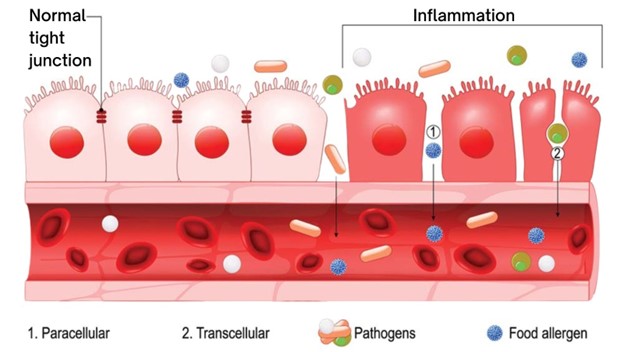Have you been told you may have a leaky gut? Not sure what a leaky gut even is? With so much buzz on social media about people healing their gut it can make us wonder– do I need to heal my gut too? Is this just another trend, or should I actually be concerned? Let’s talk about it!
What is a leaky gut?
The picture above shows what happens when the walls of our intestines become inflamed. The left side shows a normal tight junction or a normal intestinal barrier. This barrier acts like a wall with doors and only allows certain nutrients into the bloodstream. Our bodies thrive when we have normal tight junctions because only the nutrients we need are allowed into the blood while everything else is removed through waste.
The right side of the image shows what happens when we have an increased intestinal permeability or too much space between the cells of the intestinal walls. More space between these cells means more toxins can pass through and go directly into our bloodstream. This is called Leaky Gut which wreaks havoc on our bodies.
As you now know, a leaky gut is the increased space between the cells of our intestinal wall, which allows toxins into the blood. Did you know there isn’t a diagnostic test for leaky gut? Leaky Gut is still a relatively new condition requiring more studies before being officially deemed a medical diagnosis. Scientists and doctors recognize the importance of a healthy intestinal barrier and that it is harmful when inflamed.
What is Zonulin?
Although a diagnostic test doesn’t exist quite yet, some bodily markers can indicate a high intestinal permeability. Zonulin is the marker that is most indicative of increased intestinal permeability. Zonulin is a protein that causes intestinal permeability. Zonulin’s release is triggered by inflammation, infection, and diet.
Diet, for example, plays a role in the increase of zonulin when we eat gluten-containing foods. Gluten is one of the major causes of increased zonulin levels, even in people who do not have gluten sensitivity. Zonulin levels can be extremely high in those who have gluten sensitivity and regularly eat gluten. This indicates that the tight junctions are weak.
Eating foods that we are sensitive to can cause inflammation which produces more zonulin and therefore weakens our intestinal barrier. If we don’t stop eating our trigger foods to give our gut the time it needs to heal, the intestinal wall will remain damaged, and symptoms will not go away.
Our gut bacteria also play a role in our intestinal permeability. We have a mix of good bacteria and bad bacteria that help keep our GI system running smoothly when balanced. Dysbiosis or an imbalance of the gut bacteria also leads to increased intestinal permeability and its symptoms.
What are the symptoms?
Symptoms related to a leaky gut can present themselves in many ways. The most common signs are inflammation, indigestion, diarrhea, gas, and bloating. These are some of the firsthand symptoms seen in people who experience leaky gut because they are directly related to the gut. Other symptoms include fatigue, brain fog, acne, skin rashes like eczema, and can even lead to autoimmune disorders. Recent data shows that some autoimmune disorders have been treated and can potentially be reversed by healing the gut!
A leaky gut is also associated with diabetes, inflammatory bowel disease, multiple sclerosis, depression, and other mood disorders. Unfortunately, leaky gut can hide and not always show symptoms related to the gut. This makes it even harder to determine whether some sort of intestinal disruption is going on.
I think I have a leaky gut– what now?
If you have been dealing with GI issues for a long time and haven’t yet figured out the cause, you may be experiencing a leaky gut. Similarly, if you deal with multiple other symptoms mentioned, you may have some intestinal permeability causing those symptoms. Talking to your doctor about your symptoms and concerns with leaky gut is recommended. Typically, a stool sample test is done, which tests for zonulin levels. If they are found to be higher than normal, you’ll need to start the journey to healing your gut! We at AZ Dietitians can also order testing to help you figure out if you could have this condition.
How to take care of your gut
Some tips to prevent leaky gut or even possibly heal it include:
1. Cutting your food triggers out. Figuring out your food triggers can be done through a stool test. Another way to do this is by cutting out some of the major triggers like gluten and dairy, then introducing them back in to see if you react. We recommend following a specific protocol for this, so we recommend seeing one of our dietitians to help you through this process.
2. Take pre- and probiotic supplements. Anyone can benefit from taking these supplements. If you want to know exactly which ones to take, we can order testing to know which strains are running low or high in your gut.
3. Eating enough fiber is another huge help in keeping your gut bacteria balanced. Fiber is a natural prebiotic that helps feed our good bacteria allowing it to thrive and keep our gut happy. The best way to get more fiber is by eating a plant-based diet. Eating more plants provides you with great fiber and a variety of essential nutrients.
4. Limit your alcohol intake. It’s not secret that large amounts of alcohol are bad for us. Did you also know that they can affect our gut bacteria? Having a lot of alcoholic drinks has been shown to lower our good bacteria and increase our bad bacteria.
5. Supplement with vitamin D if your levels are low. A vitamin D deficiency has been shown to negatively alter the gut barrier. We also know that vitamin D has been shown to have anti-inflammatory properties. The best source of Vitamin D is natural sunlight, but many of us don’t get a daily dose of sunlight in anymore! On top of that, we’re not making up for the lack of sunlight through food sources of Vitamin D. Food sources include beef liver, egg yolk, and various kinds of seafood (although you’d need to eat a lot of these foods daily to get your recommended amount). If you do plan to take a supplement, choose vitamin D3 as it is the most readily absorbable form.
Conclusion
You don’t have to suffer in silence if you deal with multiple GI issues regularly. Schedule a visit with one of our dietitians, and we can discuss the many options we have (including a stool test) for you to get back to feeling like yourself.







